| Srl | Item |
| 1 |
ID:
124377
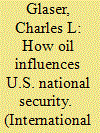

|
|
|
|
|
| Publication |
2013.
|
| Summary/Abstract |
How do states' oil requirements influence U.S. national security? Although a great deal of attention has focused on "energy security," scholars and policymakers lack satisfactory answers because little analysis links states' energy requirements with the probability of military conflict. Developing an analytic catalogue of the ways in which states' oil requirements could influence U.S. national security is the first step in closing this gap. Possible mechanisms include vulnerable access to oil that threatens a state's military capability; military policies designed to protect access to oil that threaten another state's military capability, which in turn create an access-driven security dilemma; and oil reserves that increase the value of territory, generating a conflict that draws in the United States via an alliance commitment. A distinctive feature of this framework is that some of these mechanisms identify threats to U.S. security that flow from another country's consumption of oil, not from U.S. consumption. Of particular importance is the potential danger that Chinese oil imports create for U.S. security-China's efforts to protect its sea lines of communication are fueling military competition that could strain U.S.-China relations and increase the probability of conflict between them. Policy options for dealing with these dangers share little with the standard options prescribed for dealing with the dangers related to Persian Gulf oil and U.S. oil consumption.
|
|
|
|
|
|
|
|
|
|
|
|
|
|
|
|
| 2 |
ID:
096340
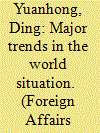

|
|
|
| 3 |
ID:
123349
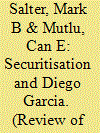

|
|
|
|
|
| Publication |
2013.
|
| Summary/Abstract |
To advance the on-going debate on Securitisation Theory (ST), we argue that the important questions of audience and attention can be addressed through careful historical study. In an analysis of the securitising moves concerning the American military base on Diego Garcia, we are able to demonstrate that the Copenhagen and Paris Schools are not methodologically incompatible, and empirically that public attention for security issues has a tendency to dissipate without continual discursive investment.
|
|
|
|
|
|
|
|
|
|
|
|
|
|
|
|
| 4 |
ID:
097072
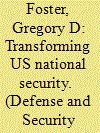

|
|
|
| 5 |
ID:
100138
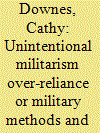

|
|
|
| 6 |
ID:
046624
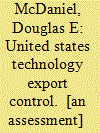

|
|
|
|
|
| Publication |
London, Praeger, 1993.
|
| Description |
xxi, 290p.Hardbound
|
| Standard Number |
0275941647
|
|
|
|
|
|
|
|
|
|
|
|
Copies: C:1/I:0,R:0,Q:0
Circulation
| Accession# | Call# | Current Location | Status | Policy | Location |
| 045873 | 382.4562000973/MCD 045873 | Main | On Shelf | General | |
|
|
|
|
| 7 |
ID:
124232
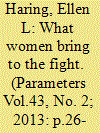

|
|
|
|
|
| Publication |
2013.
|
| Summary/Abstract |
The recent decision to integrate the US military fully was met with a range of emotions. For some it was a misguided decision that would erode combat effectiveness and have negative consequences for US security. Various objections were raised to justify keeping women out of combat units but most have been demolished by ten years of combat. This article exposes the flaws in two of the more persistent objections: (1) the presence of women in combat units will erode the vital bond that develops between men and (2) women are not as strong as men and so put male soldiers at risk.
|
|
|
|
|
|
|
|
|
|
|
|
|
|
|
|